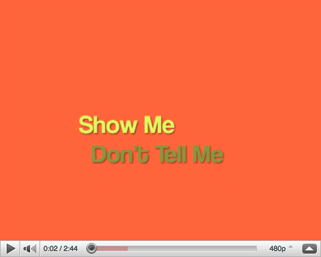 As you may know, the first rule of writing good fiction is, “Show me don’t tell me.” The idea being that you can’t say a character is resilient, thoughtful, or brave you need to show the reader that he or she is these things.
As you may know, the first rule of writing good fiction is, “Show me don’t tell me.” The idea being that you can’t say a character is resilient, thoughtful, or brave you need to show the reader that he or she is these things.
Somehow this idea has not translated into our other writing, particularly in the context of applying for jobs. For example, how many of us have seen cover letters in which a candidate describes him or herself, “a real go getter,” only to have that resume collecting dust on our desk three weeks later—three weeks during which that “go-getter” of a candidate didn’t pick up the phone?
How else might a go-getter distinguish him/her self from the pack? Well, recently I walked out of Grand Central Station to find two young people dressed in business suits standing on the sidewalk handing out copies of their resumes. What were their stated objectives? Entry-level jobs in finance and marketing. Their qualifications? The usual for people just starting out—captain of the swim team, internship at local retail store, a summer at the local copy shop. In addition to hard copies of their resume, however, they had also blown each up to a poster-board size and created video resumes and posted them on YouTube—the URL for these was at the top of their CV’s. Seeing these actions told me more than any video: they were creative, gutsy, and self-confident. You can bet that if I had been at a financial or marketing firm with—or without—an opening, they would have been hired on the spot. They brought being a ‘go-getter’ to life.
Another gap in candidates’ descriptions of themselves is often revealed via a technique I recently heard HR professionals are using to weed out those who are truly committed to working for a particular firm from those who are not: what they do is stop the interview halfway through and says “I just don’t think you’re the right fit for us”—regardless of the candidate’s experience. One of the HR professionals with whom I spoke says it’s amazing how many people actually say, “I actually didn’t think so either, but I just thought I’d come in…”
Um…how not to wow.
How do I recommend you handle this situation, should you encounter it? First, make sure you don’t look down, lean back….reveal your discomfort through your body in any way.Smile. Inhale. Speak on an exhalation. Say, “I understand how you may think that, given my lack of experience with X/my checkered past/how long I’ve been freelancing, but I think you’ve underestimated how committed I am to working for your firm. If I may, I’ll take you through my thinking one more time.” A response that, both physically, and verbally, should reassure the most hardboiled of HR professionals.
Another misstep I heard about was the story of a candidate who touted his laser focus/unparalleled dedication throughout his lunch interview, only to take out his PDA and begin returning calls as his host paid the check. My guess is that he was either uncomfortable with sitting in silence, or wished to convey his busyness/importance. What I can tell you is that his choice backfired— instead causing the HR director to move him from the top slot to the bottom of the list.
Albert Schweitzer, the famed theologian/philosopher/physician said, “Example is not the main thing in influencing others. It is the only thing.” Nowhere is this truer than in a job interview scenario—where what isn’t said is often far more important than what is.
Frances Cole Jones
Watch the YouTube Video

